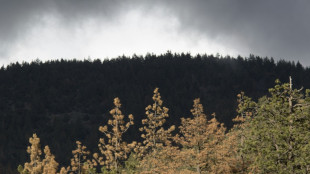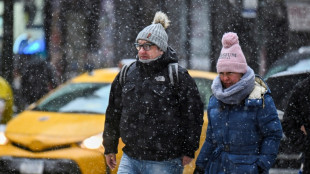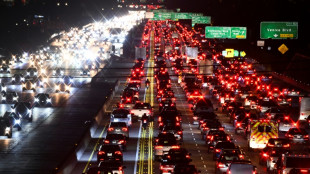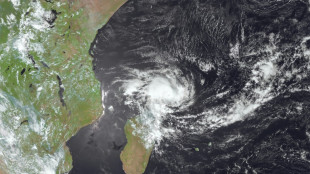Strong winds, heavy rains hit Bermuda as Hurricane Fiona skirts by
Gusts of 100 miles an hour and driving rain buffeted Bermuda early Friday, leaving thousands without power and fearing coastal damage as Hurricane Fiona, a powerful Category 3 storm, slid past the Atlantic island.
At 6:00 am local time (0900 GMT), Fiona's center was located about 155 miles (250 kilometers) northwest of the British territory, according to the US National Hurricane Center (NHC), which downgraded the storm to Category 3 on the Saffir-Simpson scale in its latest advisory.
Overnight, several areas reported power outages, with more than 7,000 people affected, according to the main electric utility.
On Thursday, with hurricane warnings in effect and the NHC forecasting sustained winds at the center of the storm of more than 125 miles per hour -- with even higher gusts -- Bermuda residents said they were taking no chances.
"This storm is going to be worse than the last one," Richard Hartley, a store owner in the capital Hamilton told AFP as he and his wife covered the shop's cedar-lined windows with metal sheets.
Hurricane-force winds extend more than 70 miles from the storm's eye, and tropical-storm-force winds up to 200 miles, the NHC said, predicting up to four inches (10 centimeters) of rain along with "large and destructive" waves and storm surge.
The island of about 64,000 people is no stranger to hurricanes -- but it is also tiny, just 21 square miles (54 square kilometers), and one of the most remote places in the world, 640 miles from its closest neighbor, the United States.
That means there is nowhere to evacuate to when a big storm hits.
"You have to live with it because you live here, you can't run anywhere because it's just a little island," said JoeAnn Scott, a shopworker in Hamilton.
Bermudians try to "enjoy it as it comes," she said. "And pray and pray. That's what we do, pray and party," she added with a laugh.
At Bermuda's famed Horseshoe Bay Beach, where onlookers came to assess the pounding waves and stretch their legs ahead of a long night inside, resident Gina Maughan said the island would be ready.
"It's always interesting to come down and see the surf," she said, watching two kitesurfers soar into the air.
"These guys are a little crazy," she added.
- Construction 'built to last' -
Because of the island's isolation, preparations are taken seriously.
Many boats were taken out of the water earlier in the week, outdoor furniture was moved inside, and the storm shutters bordering windows on most houses were checked.
Public schools will be closed on Friday, and the government announced that an emergency shelter would be opened. Buses and ferries had stopped running by late Thursday.
The Royal Bermuda Regiment was on standby to help with clearing operations, and National Security Minister Michael Weeks implored residents to stay inside until the all clear was given.
"Please Bermuda, no driving around, no venturing out to take pictures, no reckless behavior," he told a press conference.
In addition to laying in supplies of candles and food, some Bermudians were also drawing buckets of water and filling bathtubs from the tanks at the side of their homes ahead of the expected power outages.
There is no fresh water source on the island, so all buildings have white, lime-washed roofs that are used to catch rainwater that is directed into tanks and pumped into homes as the main water supply.
Bermuda, whose economy is fueled by international finance and tourism, is wealthy compared to most Caribbean countries, and structures must be built to strict planning codes to withstand storms. Some have done so for centuries.
"The construction is really built to last, and we don't see the devastation ever that the Caribbean has experienced over the years," resident Elaine Murray said.
Fiona killed four people in Puerto Rico earlier this week, according to US media, while one death was reported in the French overseas department of Guadeloupe and another in the Dominican Republic.
In the Dominican Republic, President Luis Abinader declared three eastern provinces to be disaster zones.
Farther north in Bermuda, islanders were calm.
"I've been through a lot of hurricanes, so no, I'm not worried," said resident Rochelle Jones.
But if things do go wrong, Bermudians will "all come out together and we help each other," she said.
D.Gallaugher--NG



